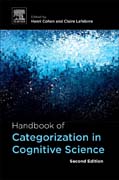
Handbook of Categorization in Cognitive Science, Second Edition presents the study of categories and the process of categorization as viewed through the lens of the founding disciplines of the cognitive sciences, and how the study of categorization has long been at the core of each of these disciplines. The literature on categorization reveals there is a plethora of definitions, theories, models and methods to apprehend this central object of study. The contributions in this handbook reflect this diversity. For example, the notion of category is not uniform across these contributions, and there are multiple definitions of the notion of concept. Furthermore, the study of category and categorization is approached differently within each discipline. For some authors, the categories themselves constitute the object of study, whereas for others, it is the process of categorization, and for others still, it is the technical manipulation of large chunks of information. Finally, yet another contrast has to do with the biological versus artificial nature of agents or categorizers. Defines notions of category and categorizationDiscusses the nature of categories: discrete, vague, or otherExplores the modality effects on categories Bridges the category divide - calling attention to the bridges that have already been built, and avenues for further cross-fertilization between disciplines INDICE: 1. To cognize is to categorize: cognition is categorization2. A modular approach to grammatical categories evidence from language diversity and contact3. Philosophical analysis as cognitive psychology: the case of empty concepts4. Categories and cognitive anthropology5. Categorization in neuroscience: brain response to objects and events6. Categorization in cognitive computer science /John F. Sowa7. Semantic categorization8. Emotion categories across languages9. The world color survey database10. Atoms, categorization and conceptual change11. Relations between language and thought: individuation and the count/mass distinction12. Why (most) concepts aren't categories13. Lexical, functional, crossover, and multifunctional categories14. Isolating-monocategorial-associational language15. On syntactic categories16. Semantic categories in acquisition17. Acquiring auditory and phonetic categories18. Syntactic categories in second language acquisition19. The development of categories in the linguistic and nonlinguistic domains: the same or different?20. Multiple systems of perceptual category learning: theory and cognitive tests21. The neuropsychology of perceptual category learning22. Neural regions associated with categorical speech perception and production23. Situated conceptualization24. Perceptual and semantic reorganization during category learning25. The return of concept empiricism26. Categorization, reasoning, and memory from a neo-logical point of view27. Approaches to grounding symbols in perceptual and sensorimotor categories28. Embodied categorization29. Categorization of objects, scenes, and faces through time30. Adaptive categorization and neural networks31. A grounded mind in a robotic body32. Concept learning and nonmonotonic reasoning33. Categorization in symbolic data analysis34. Category formation in self-organizing embodied agents35. An information-based discussion of vagueness: six scenarios leading to vagueness36. A smooth introduction to symbolic methods for knowledge discovery37. Genre-specific text mining and extensional inductive concept recognition: a pseudocognitive approach38. Classification and categorization in computer-assisted reading and text analysis39. Graph matching, system design and knowledge modeling40. Nominalism and the theory of concepts41. Why do we think racially?42. Neurosemantics and categories43. Conceptual analysis and philosophical naturalism44. Crisis! what crisis?
- ISBN: 978-0-08-101107-2
- Editorial: Elsevier Science
- Encuadernacion: Cartoné
- Páginas: 1278
- Fecha Publicación: 16/06/2017
- Nº Volúmenes: 1
- Idioma: Inglés
